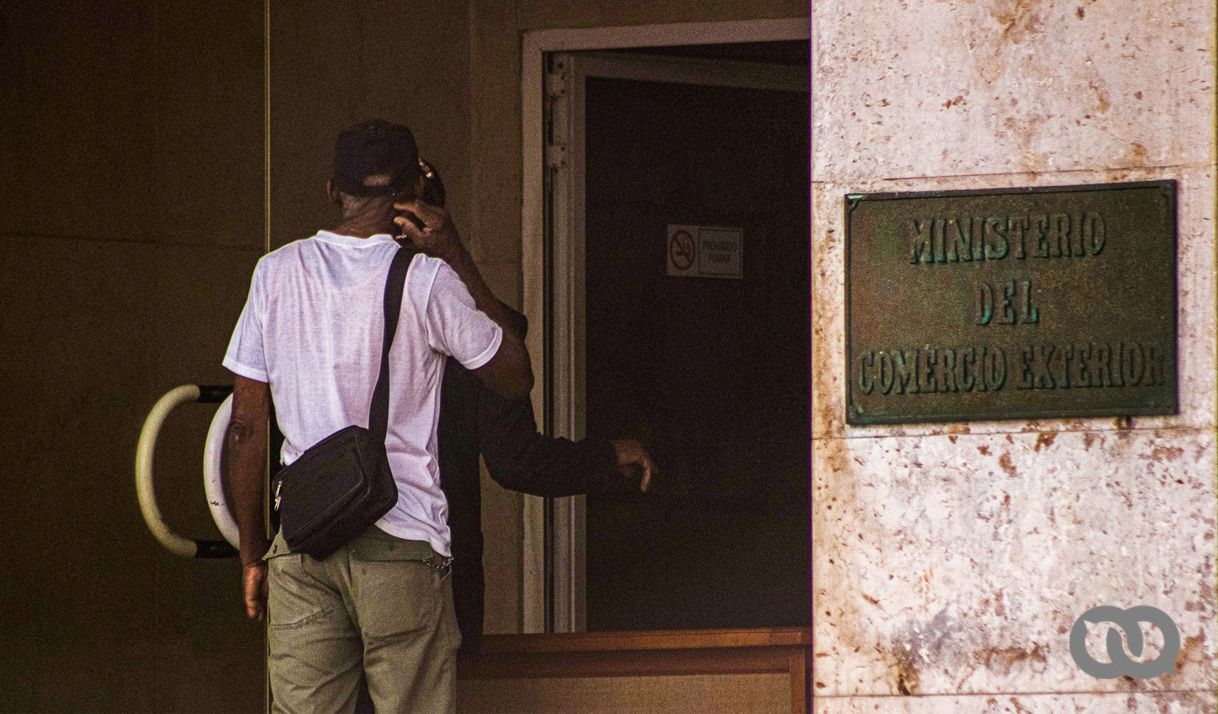When the Cuban Government undertook an economic reform in October 2019, to overcome the coyuntura (temporary situation) – the fuel crisis that had been decreed a month before -, the stores with dollar prices became a highly publicized and controversial measure.
However, the reform went further. It also contemplated lifting Customs duties or discounts for imports of raw materials and basic essentials, as well as extending purchases abroad of cars destined for individuals. Cuba’s commercial corporation CIMEX would lead the group of companies authorized to practice new forms of trade.
“Domestic demand is a significant driving force in the economy [and] much-needed foreign currency is escaping the country,” the Minister of Economy and Planning, Alejandro Gil, announced on a Mesa Redonda episode on the issue. The Government’s mission was to compete with “mules” to access foreign currency.
At that time, and in anticipation of the Government’s decision, Auge consulting firm surveyed 126 businesses in Havana to ask what resources needed to be brought into the country. “The list could serve as a preliminary guide so new importing companies can get a better idea of what the self-employed need,” Oniel Diaz, Auge’s director, explained. Technological items, hardware and textiles were emphasised on this list.
Three years later, government targets haven’t been met and the private sector stil doesn’t have unobstructed channels for its foreign trade relations.
What do state-led import companies do?
A few weeks ago, Jose Luis Hernandez, a programmer from Havana, posted a question in the Facebook group Mipymes Cuba asking about the purpose of import companies, stressing the fact that “we have to put money upfront into the supplier’s account.” “I’ve interviewed salespeople from different authorized foreign suppliers in the country, and they told me that they have millions of dollars-worth of merchandise in warehouses, but they aren’t allowed to sell to clients directly,” he explained.
Ever since the Ministry of Foreign Trade and Foreign Investment (MINCEX) published the first edition of its directory of state-led companies that are authorized to provide “foreign trade services to private businesses,” in July 2019, the number of import companies went up from 41 to 60, although this hasn’t managed to iron out their irregular and expensive service.
“There is considerable dissatisfaction,” President Miguel Diaz-Canel admitted in February 2021 when he had a look at the program. Out of the 58 companies that were approved at the time, 21 had yet to carry out their first operation, and the rest were navigating the over 70 regulations established to regulate foreign trade. Some of the legal corpus is out of date and contradictory, “and isn’t in keeping with the new economic situation,” the director of MINCEX, Rodrigo Malmierca, said.
Foreign trade managed by the State has a strong import nature and is governed by the premise of putting forward products that are in the trading company’s interest, instead of operating as a traditional intermediary.
According to MINCEX, 9,000 import contracts were signed between mid-2020 and the end of 2021, worth a total of 139 million USD; while only 170 export agreements were made, which were valued at just over 12 million USD. Out of the imports that were made, approximately 6,000 were made by purchasing products in deposit or Customs warehouses; which means they were taking advantage of what was already available on the island.
A restaurant owner who asked to remain anonymous said that import companies such as CIMEX and Tiendas Caribe try to promote products from suppliers they have a prior relationship with, “regardless of whether they are more competitive or not.” His last experience of this was a few months ago when he wanted to buy several sets of professional utensils for his kitchen.
“Even though we’d got in touch with the seller and drafted up an agreement with them, the import company delayed the formality by weeks for different reasons, while they tried to offer us lower quality options. I ended up buying the utensils somewhere else in the end,” he said.
“Available in Cuba…”
The electricity crisis proved the efficiency of private import companies compared to the incompetence of state-led companies that are authorized to undertake foreign trade operations: thousands of portable generators were brought to Cuba in just a few months to meet the needs of Cuban families, a market that the State didn’t even try to supply.
Making foreign trade more flexible is something economic actors and experts have been demanding for a long time, but the Cuban authorities insist on holding onto their monopoly of the sector. Any opening is considered one of the “stategic mistakes [that will lead] to the destruction of Socialism,” as said by Raul Castro during the VIII Congress of the Cuban Communist Party. Only pressure from an undersupplied domestic market and problems with foreign suppliers managed to force them to authorize a limited number of companies to operate with foreign capital focusing on domestic trade.
This was a discretionary measure. Although when MINCEX announced this last August, it insisted that the “foreign trade monopoly” would remain in the State’s hands,” it also left the door open to the possibility that “private economic actors” would be able to import directly. Permits will be granted to a “certain group by the authorities,” deputy prime minister of MINCEX, Ana Teresita Gonzalez, outlined.
Cuba has been facing a severe liquidity crunch for years and its import companies are operating in the red. Late payments to suppliers in Spain alone, its third leading trade partner, amounted to 350 million euros by the end of 2021, according to a report by the Spanish Secretary of State for Trade. A debt conversion program now in force between both countries has only translated into a few “medium-size investments.”
The program has probably benefitted Gran Ferretero LLC, the first mixed company authorized to engage in the island’s domestic trade. On paper, its priorities lie in working with national producers, but it will be pretty much impossible to keep the store they’re building in Havana stocked without purchases outside Cuban borders.
Gran Ferretero LLC was born in April 2022 as a result of an agreement between the Cuban Ministry of Interior Commerce and the Spanish company Gurea Industrial & Automotive Equipment Ltd.
Despite not having the same backing as the Spanish entity, some “private management methods” cover some of the vacuum left behind by state-led import companies. Some of its most beneficial clients are normally companies subordinated to the State who aren’t able to get the resources they need “legally”.
An example of this kind of relationship is the one between medium-size company Renova and the Provincial Transport Company in Camaguey, supplying batteries, tires and spare parts. However, the Ministry of Transport marketers need to get parts at the best price on the market, making the most of the advantages of wholesale imports.
In August 2020, the Ministries of Economy and Planning, Foreign Trade and Foreign Investment, and Finance and Prices, issued regulations that new management companies need to abide by when exporting and importing via state-led companies. Resolution 315 by MINCEX set out payments for “national transport, freight, insurance, Customs operations, trade margins and other related expenses,” but didn’t specify exact amounts.
Dealing with the issue of “distribution of revenue received from exports and imports,” MFP’s Resolution 210 referred to “trade margin rates [for importers] approved by this Ministry, according to the level of traffic and the group of products moving.” In other words: at a variable rate which is the equivalent of 3% of the nominal import price. Along with Customs taxes and other payments that need to be made upon entry into the country, the final cost could end up being up to 10% of the value of imported products.
This might seem like a reasonable number at a glance. The thing here though, is that many economic actors don’t directly interact with foreign suppliers or with Cuban import companies, so they are forced to pay commissions to intermediary companies – private or state-owned. Under these circumstances, the price of products “in Cuba” are almost always more expensive than they are abroad.
This is normal is the agricultural sector, for example. El Toque exposed how tractors and other tools are sold by GELMA (the Logistics Business Group of the Ministry of Agriculture) at prices that are double or more their price on the international market. In April, a report by national TV indicated GELMA’s high feed prices as one of the obstacles standing in the way of recovering pig farming.
GELMA’s organizational structure plays a hand in its inefficiency. Only one of its subordinated companies, the System for the Wholesale Sale of Agricultural Supplies is allowed to import. But it isn’t selling products that it brings into the country, it is rather distributing products to other companies in the group, which they are responsible for selling. Each of these companies adds their “profit margin” to the product’s initial value, making it more expensive.
On the other hand, producers unable to export their goods directly means a loss of revenue, in the millions sometimes. A “traceable” example is apiculture, the only agricultural sector in Cuba that has recorded positive results in recent years.
The 2021 harvest was the best harvest on record with 10,500 tons of honey. Over 8,400 tons were sold to customers in the European Union, for an average price of 2000 euros per ton. Meanwhile, beekeepers received between 30,000-45,000 pesos per ton, a bonus to use at the dollar stores and subsidies to buy supplies and fuel. However, producers and farmers have complained many a time about late payments for their harvests.
“The Cuban State is facing a significant shortage of foreign currency and is in no position to ensure supplies for chains of state-led stores, including those that sell in dollars,” economist and university professor Mauricio de Miranda reflected, in a video published by El Toque in mid August.
“Official discourse insists on “changing whatever needs to be changed” and in “letting productive forces loose”, but this is just rhetoric. Letting productive forces loose means getting rid of all of the obstacles that stand in the way of its development. Nevertheless, every measure adopted includes restrictions that limit efficiency,” the economist added.
Yet nothing indicates that the Government has plans to eliminate a system that allows them to have firm control of the island’s economy. Without other sources of income, foreign trade is a sector that is way too valuable to give up to the “enemy”.
This article was translated into English from the original in Spanish.











comments
We moderate comments on this site. If you want to know more details, read our Privacy Policy
Your email address will not be published. Mandatory fields are marked with *